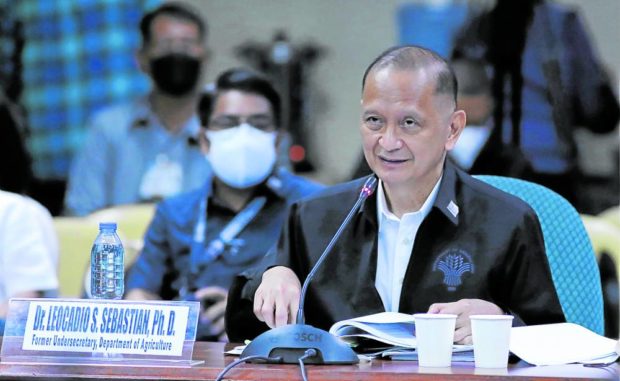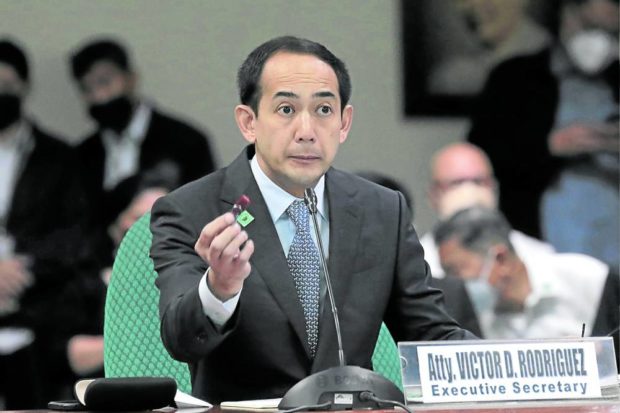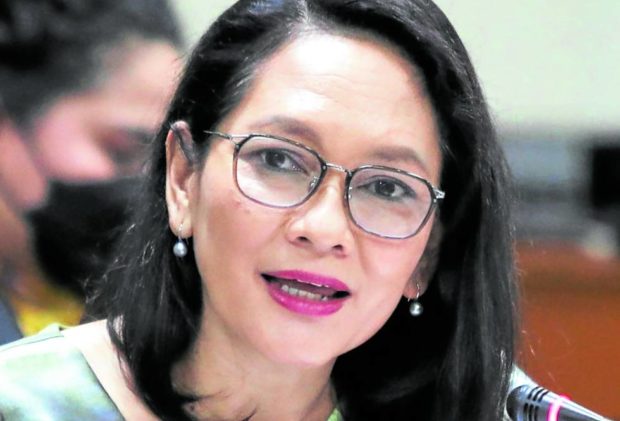Former DA exec says he ‘personally’ informed Bongbong Marcos of import order

Former Agriculture Undersecretary Leocadio Sebastian (Photo from the Senate Public Relations and Information Bureau)
MANILA, Philippines — President Ferdinand Marcos Jr. himself had instructed the Sugar Regulatory Administration (SRA) to come up with a “sugar importation program” that served as the basis of controversial Sugar Order No. 4, which Malacañang later disowned as illegal, resigned Agriculture Undersecretary Leocadio Sebastian disclosed on Tuesday.
Resuming his testimony at the Senate blue ribbon committee hearing, Sebastian also said Mr. Marcos and Executive Secretary Victor Rodriguez did not raise any objection to the proposal to import sugar when it was first discussed in a meeting on Aug. 1 in Malacañang.
Fielding questions from Sen. Risa Hontiveros, he said he “personally” informed the President on Aug. 10 that the three-member SRA board had already issued the order authorizing the importation of 300,000 metric tons of sugar.
To his surprise, Sebastian said, the President promptly told him that he was “not in agreement” to bring in a large volume of the commodity despite discussing it at the meeting with officials of the Department of Agriculture (DA) nine days earlier.
‘Already aware’
“After that meeting (with DA officials), I got a feedback from (then SRA) administrator (Hermenegildo) Serafica when he emailed me that he was instructed to draft the sugar importation program by the President,” Sebastian told Hontiveros.“And if you are instructed to draft the sugar importation program, that means they are already aware that there’s an importation that has been planned,” he said.
Article continues after this advertisementHontiveros said this belied Rodriguez’s claim that the Palace learned about SO 4 only when it was uploaded on the SRA website on Aug. 10.
Article continues after this advertisementTimeline
Sebastian said the President, Rodriguez and other DA officials who were at the meeting have “already been informed” about the volume to be imported.
Mr. Marcos, who chairs the SRA board as the concurrent acting agriculture secretary, directed the DA officials to “act fast” in reclassifying the stockpile of sugar from “reserved” to “domestic use” and address the “need to augment our local supplies through importation,” according to Sebastian.
“There were no objections to the importation program or any reservation (regarding the proposal),” he said.
Asked by Hontiveros if the Chief Executive “explicitly” mentioned the need to buy sugar from other countries, Sebastian said: “Yes, your Honor. That was part of the briefing that (Serafica) gave and also the President agreed [that] there’s a need to consider that.”
“In fact, Serafica was given instruction to start preparing a sugar importation program,” he continued.
Subsequent meeting
The agriculture official said the planned sugar importation was again brought up in a subsequent meeting on Aug. 4.
As Rodriguez had earlier disclosed, Sebastian said it was after that meeting when the executive secretary directed Serafica to submit a draft sugar order.
Serafica affirmed Sebastian’s testimony.
“After presenting to the President … the challenges in the sugar industry, my last course of action was to prepare a draft order on another import program for SRA board approval,” Serafica said.
“In that instant, after everything was discussed, the President said ‘submit an importation plan,’” he noted. “I did not hear any objection [about the importation] at that point.”
Hontiveros said the testimonies of Sebastian and Serafica raised more questions and exposed the “discrepancies” in the statements issued by Rodriguez and the Palace on the issue.
“Why the subterfuge? Why send signals that you were in favor of importation only to take it back later?” Hontiveros asked. “What is the ES (executive secretary) hiding? What information doesn’t he want the public to know?”
“What’s clear to me so far is that many things are not clear. And it also seems that many powerful forces are at play,” she added.
Hontiveros asked Sen. Francis Tolentino, who presided over the hearing as blue ribbon committee chair, to summon Rodriguez after he skipped the proceedings to attend a Cabinet meeting.
Traders blamed
In the hearing, senators also accused local traders of raising the price of sugar in the country, which has allowed them to rake in excessive profits, and for causing a sugar shortage .
Senate President Juan Miguel Zubiri said that even before the sugar crisis broke out, traders were reportedly buying sugar at P45 to P50 a kilo, but were selling these at P80 to P90 a kilo.
“So in this case, the traders are the ones making a killing by trying to make a profit of P30 to P40 a kilo; that is the main problem—the huge profits that traders are trying to protect in the local market,” he said.
Zubiri, who belongs to a family of sugar producers in Bukidnon province, drove home the point that traders were creating an artificial shortage to be able to sell their stocks at higher prices.
Senate Minority Leader Aquilino Pimentel III wondered how traders were able to bring down the price of sugar in the supermarkets following a request from Malacañang.
“Let us remember that the 300,000 tons of sugar supposedly from SO 4 did not arrive, and yet, the prices of sugar went down from P110 to P70. So is this an artificial price or somebody somewhere is absorbing a loss?” Pimentel asked Pablo Lobregat, president of the Philippine Sugar Millers Association.
Lobregat replied: “It’s not actually a loss, but an opportunity to make more money.”
Sen. Cynthia Villar, chair of the Senate committee on agriculture, blamed a cartel among sugar importers that was supposedly controlling the country’s supply of sugar and pushing the prices higher.
‘Visits,’ not ‘raids’
Meanwhile, Hontiveros also wondered why Malacañang had described as “raids” the operations that the Bureau of Customs (BOC) carried out on warehouses storing sugar, which the SRA later said were authorized to keep the commodity.
Quizzed by Tolentino, Customs Commissioner Yogi Filemon Ruiz clarified that the operations were “not raids,” but merely “visits” to check if the stockpiles of sugar legally entered the country.
He said the operations were made based on “letters of authority” that he had issued to BOC personnel to inspect warehouses suspected of keeping smuggled goods.
—WITH A REPORT FROM JULIE M. AURELIO
RELATED STORIES
Hontiveros sees ‘many powerful forces at play’ in 300,000 MT sugar import mess
Sugar shortage not artificial, group says
Bongbong Marcos did not oppose proposed 300,000 MT sugar importation – officials

